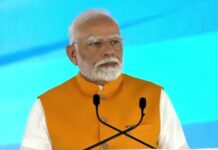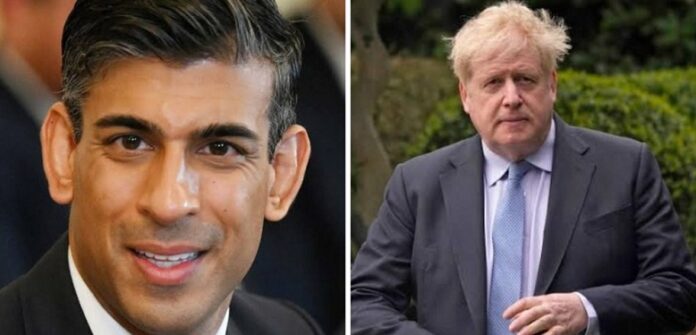By Dr Bhabani Shankar Nayak
LONDON: The hundred and six pages Partygate inquiry report, conducted by the Privileges Committee of the British Parliament, not only highlights the evident character of Boris Johnson as a habitual liar but also exposes the deceptive political strategies employed by the Tories. The timing of the report’s release is part of a broader strategy by conservative spin doctors to construct a convenient exculpatory narrative, allowing both past and current Tory Prime Ministers to evade accountability for their utter failures while diverting public attention.
The Conservative Party has been successful in diverting public scrutiny for the past fourteen years, employing customary tactics that have shielded five of its Prime Ministers from public and parliamentary scrutiny. Boris Johnson is not the first liar in Tory politics, nor will he be the last in British politics.
It is customary for both the ruling classes and non-ruling elites in British politics to propagate lies to serve their own interests. Throughout history, political integrity has been foreign to the British ruling classes. The Partygate report may unveil the truth, but ironically, truth itself becomes a casualty, where Tories escape accountability and outsource the blames on others. Will Boris Johnson be remembered as the first liar in British politics? And will he be the last?
Lies in British politics are not coincidental; they are deeply ingrained. Deception and misleading both the Parliament and the public have become customary practices in modern British politics. Manipulating public opinion through diversionary tactics has become a weapon for gaining and retaining power. False narratives and political expediency lie at the core of modern British politics, spanning from Churchill to Sunak.
The Tory-led “EU Referendum” project, for instance, was built upon a foundation of lies. Similarly, the Labour Party, under Tony Blair, infamously presented the “dodgy dossier” that served as a pretext for the invasion of Iraq in 2003, also based on a pack of lies. The Costs of War Project report by Brown University and the Watson Institute for International and Public Affairs revealed the devastating toll of the Iraq war from March 2003 to October 2018, with an estimated 268,000 to 295,000 people killed in violence, including 182,272 to 204,575 civilians according to Iraq Body Count’s figures. Tony Blair’s lies resulted in the loss of millions of Iraqi lives.
The consequences were dire, not only in terms of human lives but also in financial terms. British taxpayers were burdened with a staggering £8.4 billion, and numerous British and American soldiers paid the ultimate price for the lies perpetuated by war criminals like Tony Blair and George Bush. The mistakes made by Blair and his counterparts were not mere errors but deliberate falsehoods that led to catastrophic consequences. The cost in terms of lives lost and resources squandered cannot be understated, and it is a painful reminder of the grave impact that lies and deception can have on the world.
The vilification campaign against former Labour leader Jeremy Corbyn is yet another example of the pervasive use of lies in British politics. Corbyn’s unwavering honesty and integrity in both public and private life became a disqualification in the eyes of the British political establishment. The ruling classes orchestrated his defeat, but they were unsuccessful in tarnishing Corbyn’s reputation for honesty and integrity. Despite enduring relentless vilification, Corbyn continues to hold a prominent position in British politics. The truth has a remarkable resilience throughout history, and no matter how much reactionary propaganda is employed, it cannot conceal the everyday realities of politics in Britain. Corbyn’s steadfastness in the face of such attacks serves as a testament to the enduring power of truth. While the British ruling classes may have sought to undermine Corbyn, they have failed to extinguish the genuine integrity that he embodies.
The literal normalisation and naturalisation of Kiplingian lies have played a role in shaping and domesticating everyday lives in Britain. The persistence of otherness in British politics is evident as the current Tory Prime Minister, Rishi Sunak, leads efforts to target establishments such as restaurants, car washes, nail bars, barber shops, and convenience stores in order to apprehend so-called illegal immigrants, many of whom are among the poor and homeless. It is important to question who these individuals labelled as illegal immigrants truly are, why they have come to Britain, and the circumstances that compelled them to leave their loved ones and homes behind.
The lives and livelihoods of people in Asia, Africa, and Latin America have been devastated by colonial and neo-colonial wars, as well as neoliberal economic policies. These individuals have been sold fraudulent dreams of a better life in Britain and America, prompting them to embark on perilous journeys across treacherous waters and roads. Tragically, their paths often lead them to death, destitution, or encounters with figures like Prime Minister Rishi Sunak, who acts as a heartless immigration officer.
Rishi Sunak’s temporary role as an immigration officer is a part of a juvenile and deceptive practice employed to divert attention from his party’s failures and shield himself from public scrutiny. The racist political tactics rooted in colonial discourse on migration form the core of the lies perpetuated by the British ruling class. Blaming refugees and illegal immigrants for health and homelessness crises allows the Tories to find respite for their own underfunding and austerity measures while evading accountability. These lies and misleading narratives provide a smokescreen for the Tory government’s own failures and create a buffer against public scrutiny. It is crucial to challenge and expose the deceitful practices that perpetuate injustice and divert attention from the real issues at hand.
The history of Pax Britannia is indeed tainted by a legacy of lies, dishonesty, death, destitution, robbery, looting, scandals, and deceptive practices perpetrated by the British colonial empire. The concept of “civility” and the so-called “civilizing” missions of British colonialism served as a grand deceit to exploit people and plunder their resources. The notion of colonial civility, in reality, meant endless murder, boundless exploitation, and the enslavement of indigenous populations in their own lands. The absence of accountability defined the scandals of the British empire, allowing its atrocities to go unpunished.
The relationship between lies and British politics is deeply entrenched in history, with the ruling classes weaving deception into the very fabric of political discourse in modern Britain. Lies, misinformation, and deceptive political strategies serve to undermine democracy and weaken citizenship by sowing disillusionment among the masses. They provide a means for the ruling and non-ruling elites to evade public scrutiny and democratic accountability. The erosion of trust, accountability, and the subversion of democratic processes are central to the growth of a culture of depoliticisation, which aligns with the requirements of capitalism to shield itself from democratic scrutiny.
Boris Johnson represents the epitome of deceptive politics in contemporary Britain, where the ruling class undermines democracy and democratic practices to subjugate its citizens through the proliferation of lies. The purpose is to domesticate the population and maintain control in the name of nationalism based on white supremacy.
Working class politics offers an alternative to combat the pervasive culture of deceptive mainstream politics in Britain and beyond. Grounded in the reflections on the everyday realities of both material and non-material aspects of people’s lives, working class politics has the potential to drive transformative change in society along a progressive trajectory that aligns with the needs and aspirations of the masses. Working class politics is rooted in an understanding of the mosaic of truth and reality, acknowledging the historical struggles of the working class against various forms of capitalist deception.
Throughout history, these struggles have highlighted the need for alternatives that challenge the status quo and address the systemic injustices perpetuated by deceptive political practices by the ruling classes. The resurgence of working-class alternatives is evident, and it is crucial for society to open its doors and windows to embrace the working-class political struggles. By doing so, we can strive towards a peaceful and prosperous society that is founded on truth and authenticity, moving away from the manipulative tactics of deceptive politics. Embracing working class politics provides an opportunity to prioritise the well-being and aspirations of the majority, fostering a more equitable and just society for all.
(The writer Dr Bhabani Shankar Nayak, hails from Eastern Indian State of Odisha, Presently Teaches at University of Glasgow, London, UK and has 2 Decades of Teaching Experience in British Universities. Views Expressed are Personal).





























